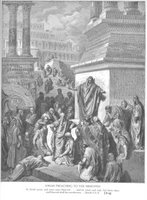A Bitter Response

As you read the book of Jonah, one of the most striking features is the abruptness with how the book ends. Jonah, having been questioned by God, simply does not answer and goes to build a shelter to "see what would happen in the city" of Nineveh (vs 5). Apparently, he was still hoping for God to render judgment on this foreign nation.
Then we read the following verses:
Jonah 4:6-8
So the LORD God appointed a plant and it grew up over Jonah to be a shade over his head to deliver him from his discomfort. And Jonah was extremely happy about the plant. But God appointed a worm when dawn came the next day and it attacked the plant and it withered. When the sun came up God appointed a scorching east wind, and the sun beat down on Jonah's head so that he became faint and begged with all his soul to die, saying, "Death is better to me than life."
Again, we see the focus on the sovereign power of God to bring about a supernatural event with the plant and the worm. The text tells us specifically that both of these "God appointed". But He did so, not for the sake of something supernatural in and of itself. He is going to illustrate, once again, Jonah's staggering pride and hate for the nation of Nineveh.
First, YHWH appoints a plant to rapidly grow and provide him comfort. Notice that the text says "Jonah was extremely happy". The vivid words used here are to stand in stark contrast against his displeasure with God's display of mercy on Nineveh. And, as we will see, this is the purpose of God's intervention.
In verse 7, God then appointed a worm to attack the plant, and it withered. Finally, God appoints a "scorching east wind" to exacerbate Jonah's discomfort. Jonah's response? He again dwells on death.
God then asks him a question which is similar to His first question in verse 4, which Jonah did not answer. "Do you have good reason to be angry about the plant?" The response that we see is the last words from this bitter and unrepentant prophet:
vs 9b
"I have good reason to be angry, even to death"
Our "hero" of this story has saved his "best" for last. Not only are his last words filled with selfishness, but the force of the Hebrew indicates that he uses vulgar language in his reply to YHWH! And without being vulgar in return, the words "death" and "hell" are very close in the original. You can do the math on what Jonah is saying.
And so Jonah ends with this unthinkable response to the Lord of glory. God then explains the meaning behind His visual metaphor of the plant, the worm, and the scorching wind.
vss 10-11
Then the LORD said, "You had compassion on the plant for which you did not work and which you did not cause to grow, which came up overnight and perished overnight.
"Should I not have compassion on Nineveh, the great city in which there are more than 120,000 persons who do not know the difference between their right and left hand, as well as many animals?"
In other words, how could Jonah show so much concern over a plant, yet care so little for the souls of the Ninevites who are of such infinite value in the site of God? Jonah cared over a plant for which he "did not work and which (he) did not cause to grow". Yet God created the people of Nineveh, and His heart expresses infinite mercy in extending salvation to them.
In verse 11, God makes His point even stronger. In essence, He shows Jonah that the illustration with the plant perfectly communicates Jonah's lack of proper love for the lost. He is so blinded by prejudice that he cared nothing for the souls of 120,000 person "who did not know the difference between their right and left hand." In other words, these people were wicked and did not even know right from wrong. They were in a desperate circumstance of evil. And yet God, the righteous Judge, the only One who could rightly condemn, showed compassion. Then the Lord ends the book rather abruptly by saying "Jonah, you did not care even for the animals". This depiction shows Jonah's utter lack of concern for what truly mattered. "You don't care about these people? To show you how wrong you have been, do you even care for the animals?". The hyperbole is a stinging rebuke to Jonah.
And as we end this series, it strikes me that we were no better than the Ninevites before we were saved. The Scriptures tell us that we were enemies of God (Rom 5:10). We were haters of God (Rom 1:30). Yet God in His grace and mercy made us alive even when dead in, and blinded to, our trespasses (Eph 2:5).
May we as the redeemed people of God, now alive by faith, never look on the lost with a heart of prejudice or hatred. But let's go to all the nations and declare that "there is salvation in no one else; for there is no other name under heaven that has been given among men by which we must be saved." (Acts 4:12).
Believe on the Lord Jesus Christ and be saved!














